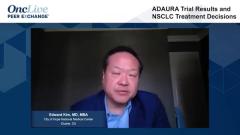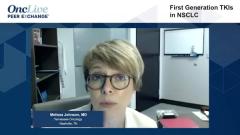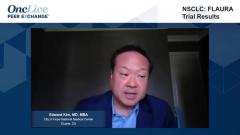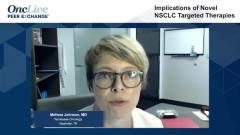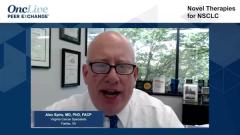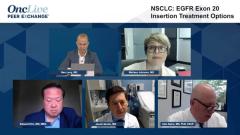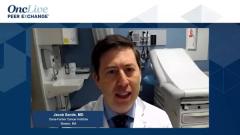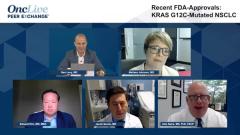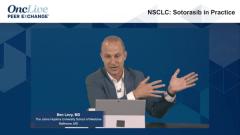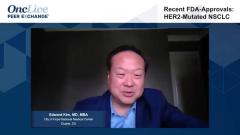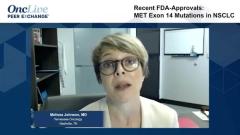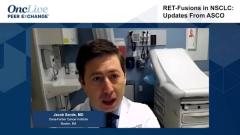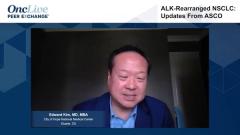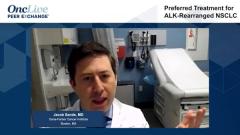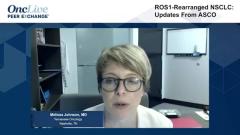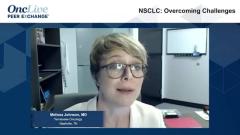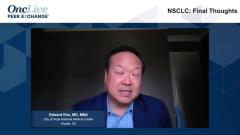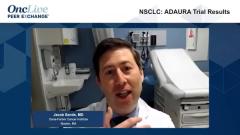
NSCLC: FLAURA Trial Results
Edward Kim, MD, briefly summarizes results from the FLAURA trial in the treatment of previously untreated EGFR+ advanced non–small cell lung cancer (NSCLC).
Episodes in this series

Ben Levy, MD: Let’s talk about stage IV EGFR-mutant lung cancer. We’ve come a long way, obviously with the advent of first-generation TKIs [tyrosine kinase inhibitor] and moving on to FLAURA with the third-generation TKI osimertinib. But we have other data as well. Ed, can you briefly bring us up to date with where we are with FLAURA with potentially adding chemotherapy to first-generation TKIs and potentially adding antiangiogenesis drugs to TKI.
Edward Kim, MD, MBA: Clearly FLAURA is the standard of care right now, and the data that came out of the study that were, first reported by Jean-Charles Soria and then Suresh Ramalingam, updated. The data are clear that this third-generation TKI is better and superior to the earlier generations. PFS [progression-free survival] was almost 19 months vs 10 months. The hazard ratio was 0.46, and the update with the overall survival showed almost 39 months vs 31 or 32 months with the older generation. It’s pretty clear that we have our baseline standard, which is front line, in these folks with sensitizing mutations. Toxicities were low, and that’s something nice to see because as we get more generations further, you start seeing additional toxicities. We’ve seen that with some other drugs and TKIs, but that was not the case here. As we’ve talked about the ADAURA data, it’s made the transition and the ease of using this therapy in the earlier-stage setting much easier.
There have been combination data reported. There are the NEJ009 data, which were presented at ASCO. This was gefitinib vs gefitinib plus chemotherapy. That’s a combination. It’s in EGFR-mutant-positive patients. It’s a phase 3 study. The chemotherapy was carboplatin-pemetrexed, and the overall survival had a hazard ratio of 0.82. It was 345 patients.
There was an increase in PFS, in PFS2 slightly, and in OS [overall survival]. All were trending in the right direction but didn’t quite hit their end point. Tata Memorial [Centre in Mumbai, India] also had reported chemotherapy with gefitinib, a very similar type of study—phase 3, 350 patients. They had a response rate, PFS and OS, that was all beneficial using carboplatin and pemetrexed. There’s some activity. Certainly, it looks like with the combination, it’s with gefitinib. A lot of these studies that were performed earlier aren’t going to be as relevant because we’re using earlier-generation drugs. There was increased toxicity that they saw in their study with the combination.
There was also another study, NEJ026, which was presented in 2020. These were the bevacizumab- erlotinib data. It was a phase 3 study of EGFR-mutant patients. Overall survival in this space was bevacizumab-erlotinib vs erlotinib, 50.7 vs 46.2 months—several months of improvement. PFS2 was 28.6 vs 24.3 months, with some benefits. But it’s unclear, adding that additional systemic biologic therapy that’s going to require an IV [intravenous] infusion every 3 weeks, how much of the magnitude of benefit you’re going to get there, especially for patients.
RELAY has also been published previously. This is a similar type of study, using only ramucirumab-erlotinib vs erlotinib in EGFR-mutant folks. It was a phase 3 study. PFS was 19.4 vs 12.2 months. There was some benefit there, but grade 3/4 toxicity was definitely higher. These are things that people have talked about. We’ve all talked about them. These data wouldn’t move me in the direction of adding a combination up front in these folks, especially when our standard is excellent.
Many of us have toyed with the idea at progression, and progression is a vague term for many of us. It can mean new disease. It can mean slight growth, or diseases that exist. When we see that slight progression in existing disease, some of us are tempted to add something to boost that isn’t so toxic, rather than stopping therapy or just following it. These are the thoughts I have in first-line.
Ben Levy, MD: It’s a great overview. We can all agree that osimertinib is the standard of care first line. An easy decision for most of our patients with sensitizing mutations. The harder decision is what to do next.
TRANSCRIPTS EDITED FOR CLARITY


